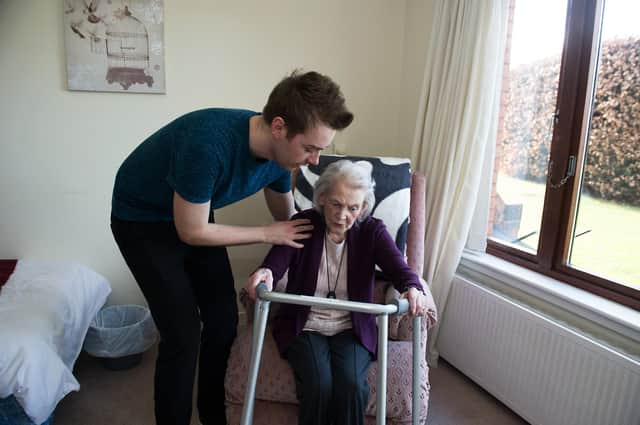Send a message of support to staff who are also carers - Sue McLintock


Delivering the Carer Positive scheme across Scotland for the past seven years, promoting flexibility in how we work has been a key element of our message to employers in how they can support staff who might be caring for someone who may be ill, older or vulnerable. The response to Covid has in fact accelerated an understanding amongst employers that more agile working can and does work, and long may that continue. More widely, we hope that employers recognise the particular challenges faced by carers and build on this opportunity to create more supportive and empathetic workplaces, thereby building the resilience and wellbeing of whole staff teams.
Carer Positive supports organisations in this aim, and through our multi-level award scheme over 200 organisations are currently recognised as ‘Carer Positive Employers’, from small voluntary organisations to large public and private sector employers. Funded by the Scottish Government and delivered by Carers Scotland, participation and resources are entirely free.
Advertisement
Hide AdAdvertisement
Hide AdThe pandemic saw the number of carers in Scotland rise by over 400,000 to stand at a now estimated 1.1 million people. Over half of those new to caring as a result of Covid have been working carers, added to the existing 270,000 combining work and care.
The impact of the pandemic on carers was evidently very hard, as care services and short breaks were withdrawn, people were increasingly isolated, and the pressures on individuals and families caring for loved ones became extreme. For those carers also working, the challenge has been doubly difficult and the chance to enjoy a life outside of caring hugely diminished.
For employers, supporting staff in a range of different circumstances has undoubtedly been far from straightforward, but some very positive outcomes have resulted from the challenges presented over the last 18 months. We have seen some great examples from Carer Positive employers of how carers have been supported through revised workplace policies, health and wellbeing schemes, virtual peer support, and awareness raising initiatives to reach out and help carers identify themselves. Perhaps most obviously (and out of necessity), online communication platforms have been embraced and have made working from home possible for many employees. Crucially, many carers have reported that without the support of their employers, they may have given up work altogether.
As workplace options are developed across the country, I would urge all employers to ‘sense check’ their current policies and operations, to ensure that the needs of staff with caring responsibilities are recognised, and the reality of individual circumstances factored in. It might be some time for example before care services reach their pre-pandemic level and people may still be caring for those in the shielding group and understandably wary about returning to workplaces. Equally, carers who have been lonely and isolated at home may really benefit from the chance to ‘get into work’ again. The key point here is not to make assumptions that new ways of working will suit all staff in the same way.
Without even factoring in the pandemic, the number of working carers will continue to rise. Becoming recognised with a Carer Positive award sends a strong supportive message to both existing and potential new staff, as well setting an excellent standard as an employer in Scotland.
Sue McLintock is Manager of the Carer Positive Awards. Visit www.carerpositive.org – for more information about how you can become a Carer Positive Employer.
Comments
Want to join the conversation? Please or to comment on this article.